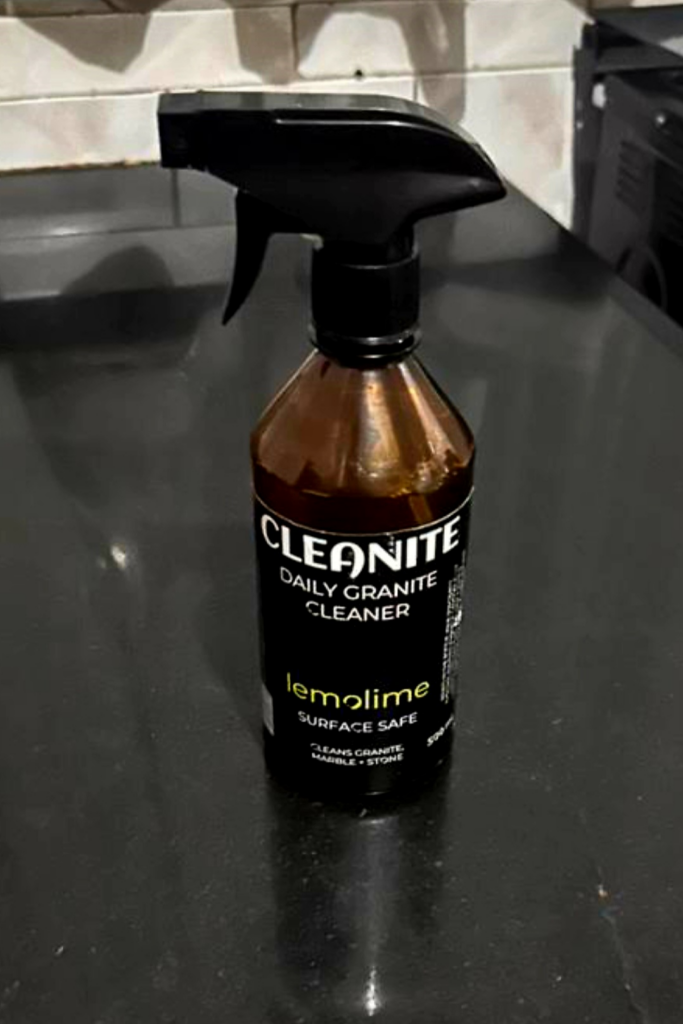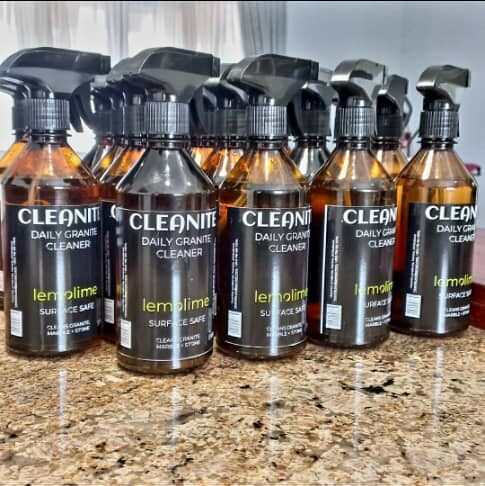Granite Care Basics
Granite surfaces are prized for their durability, elegance, and ability to add timeless beauty to kitchens and bathrooms. However, despite their strength, granite requires regular and specific care to maintain its pristine appearance and structural integrity over time. Below is a comprehensive guide on how to properly take care of granite surfaces, drawing on material science and pratical expertise.

Daily Cleaning: Gentle, pH-Balanced Cleaner (CLEANITE)
Why it is Important: Granite is a natural stone with a porous structure. Using harsh or acidic cleaners like vinegar, lemon juice or bleach can degrade its surface and weaken the protective sealant leading to etching or discoloration over time.
Solution: For daily cleaning, use a specially formulated cleaner designed for granite, such as CLEANITE. This cleaner is pH balanced, which ensures that it will not damage the stone’s surface or stip away the protective sealant. Simply SPRAY CLEANITE onto the surface and WIPE it with a soft MICROFIBER cloth to remove any dirt, grease, or residue.
Avoid Harsh Chemicals: Stick to CLEANITE (Stone-Safe Product)
Why it is Important: Acidic and alkaline cleaners, bleach, ammonia, and other harsh chemicals cause permanent damage to the granite surface by weakening the protective sealant and causing the stone to etch. Long-term use of these cleaners can result in dullness or discoloration of the granite.
Solution: Use CLEANITE! pH-balanced cleaners like CLEANITE offer effective cleaning without compromising the stone’s integrity. Avoid common household cleaners like window sprays, disinfectants, or general-purpose sprays, which may contain harmful chemicals.
Avoid Abrasives: Soft Clothes Only
Why it is Important: Granite may be hard, but using abrasive materials like steel wool or rough sponges can scratch the surface and dull the stone over time. Even minor scratches can accumulate and eventually lead to visible wear.
Solution: Always use soft microfiber cloths or non-abrasive sponges when cleaning granite. These materials are gentle on the stone but effective in lifting dirt and grime. Avoid scouring pads, which can scratch or etch the surface.

Sealing the Granite: Protecting the Stone's Porosity
Why it is Important: Granite is naturally porous, meaning it can absorb liquids and stains if left unprotected. A properly sealed granite surface resists staining and repels liquids like oils and water. Over time, the sealant will wear down, so it is essential to maintain it.
Solution: Test your granite’s sealant by sprinkling a few drops of water on the surface. If the water beads up, your seal is still intact, if it soaks in within a few minutes, it is time to reseal. Depending on usage, most countertops need resealing every 1-2 years. Use a high-quality granite sealant, applying it evenly and allowing it to absorb before wiping off any excess. Follow the manufacturer’s instructions closely for optimal results.
Prevent Heat Damage: Use Trivets and Hot Pads
Why it is Important: Granite is heat-resistant, but sudden temperature changes (thermal shock) can cause cracks or damage, especially if the stone is already compromised by a fissure or weak spot. Direct contact with hot cookware can also weaken the sealant over time.
Solution: Always use trivets or hot pads when placing hot pots, pans, or baking sheets on your granite countertops. While granite is more heat-tolerant than other materials like quartz or laminate, it is a good habit to minimize exposure to extreme heat to prolong the life of the sealant.
Clean Spills Immediately: Prevent Staining
Why it is Important: Granite can absorb liquids, especially acidic or oil-bases substances. Spills of wine, coffee, oils, or acidic fruit juices can lead to deep stubborn stains if not dealt with immediately.
Solution: For best results, clean spills as soon as they occur. Blot – do not wipe – any liquid to avoid speading it over a larger area. Use a soft cloth or paper towel to blot-up the spill and then follow with CLEANITE granite cleaner. If the spill has penetrated the stone and caused a stain, use a moist mass of baking soda and water to draw out the stain over time.

Polishing for Added Shine
Why is it Important: Over time, granite may lose its high gloss shine due to daily wear and tear. Polishing granite not only restores its luster but also provides an additional layer of protection against stains and etching.
Solution: Use a stone-safe polish periodically to maintain your granite shine. Ensure the polish is formulated for natural stone, as regular furniture polish can leave behind residue or damage the stone. Apply with a soft cloth and buff gently to enhance the surface’s appearance and texture. CLEANITE will SOON have a SHINY FINISH product to go with the Daily Cleaner.
Granite countertops are a luxurious addition to any home, but they require proper care to retain their beauty and functionality. By using the right cleaning products (CLEANITE), maintaining the sealant, and practicing good habits like avoiding direct heat and using cutting boards, you can ensure your granite countertops last for decades. Consistent maintenance with products designed specifically for granite, like CLEANITE, is the key to preserving their elegance and shine.